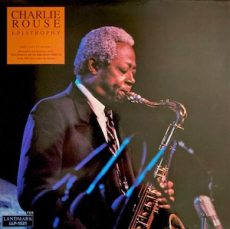
Requisites
Epistrophy: The Last Concert ~ Charlie Rouse | By Eddie Carter
Charlie Rouse was one of jazz’s great musicians, but he is best known as the tenor saxophonist in The Thelonious Monk Quartet for eleven years. He enters this morning’s spotlight with Epistrophy–The Last Concert (Landmark Records LLP-1521). The album honors the pianist and was recorded live at The Thelonious Monk Birthday Tribute during the Jazz in The City Festival. His bandmates for this exceptional performance are Don Cherry (tracks: B1, B2) on trumpet, Buddy Montgomery (B1, B2) on vibes, George Cables (A2, A3, B1, B2), and Jessica Williams (A4) on piano, Jeff Chambers on bass, and Ralph Penland on drums. Orrin Keepnews is the host. My copy is the 1989 U.S. Stereo release.
Orrin opens with a few words about Charlie Rouse before introducing him; then, the two men share Some Words About Monk that are just as entertaining as the music that follows. Nutty is taken at a medium tempo, and Charlie swings easily on the theme and the first solo. George picks up the groove and gets into something interesting; then Ralph shares the finale with Rouse and Cables preceding the ending. Ruby, My Dear is named after Monk’s first love, Rubie Richardson and is one of his most beautiful tunes. Charlie and the trio tenderly begin the melody. Rouse continues delivering the opening solo with sultry notes from his tenor sax. George compliments him with elegant execution in a short statement. Charlie adds a few final gentle touches before the closing chorus and the delight of the crowd.
Blue Monk was Monk’s personal favorite of all his compositions. Jessica takes over on piano and opens with a quirky introduction to the foursome’s bluesy melody. Charlie takes the lead solo with a relaxing informality that flows naturally. Jessica takes a comfortable ride in the second reading, and Jeff has an enjoyable moment in the closer, preceding the theme’s restatement and close. ‘Round Midnight by Thelonious Monk, Cootie Williams and Bernie Hanighen is Monk’s best-known and most recorded creation. George starts with a lengthy introduction, segueing into the trio’s gorgeous melody and the pianist’s opening solo. Buddy comes in next for a touching interpretation, and then Don expresses his thoughts in a haunting, muted performance. Charlie provides the pretty exclamation point ahead of the climax.
Epistrophy by Thelonious Monk and Kenny Clarke was the pianist’s closing number at each live set. George sets everything in motion for the ensemble’s lively melody. Don opens with a few twists and turns; then Charlie wails with ease next. Buddy answers with a spirited performance. George adds to the excitement, and Don, Charlie, and Buddy swap notes with Ralph ahead of the reprise and close, which receives abundant applause from the audience. Orrin Keepnews produced the album, and Ron Davis was the recording engineer. David Luke was the digital engineer, and the mastering was by George Horn. The album’s sound quality is stunning with an excellent soundstage that takes the listener to the club to enjoy the musicians as they are performing.
Epistrophy-The Last Concert is dedicated to Charlie Rouse’s memory and is the last album he recorded before his death from lung cancer seven weeks later on November 30, 1988. He was only sixty-four but leaves behind a legacy of thirteen albums as a leader. He also co-founded and recorded six albums with the group Sphere (Thelonious’ middle name). He also made quite a few titles as a sideman, including twenty-four with Thelonious Monk during his lifetime. Palo Alto was recorded in 1968 but not released until 2020. If you’re a fan of Monk’s music or Post Bop, I offer for your consideration, Epistrophy–The Last Concert by Charlie Rouse the next time you visit your favorite record shop. It’s one of the most enjoyable albums I’ve heard and is a title I’m sure you won’t regret adding to your library!
~ Palo Alto (Impulse B0032181-01) – Source: Discogs.com ~ Blue Monk, ‘Round Midnight – Source:JazzStandards.com ~ Epistrophy, Ruby, My Dear – Source: Wikipedia.org © 2024 by Edward Thomas Carter***In Like Bud which is included in the YouTube version of the album, is only available on compact disc and not on the original wax recording.
More Posts: choice,classic,collectible,collector,history,instrumental,jazz,music,saxophone
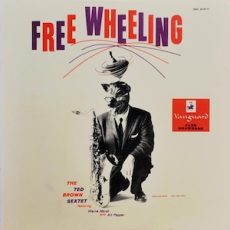
Requisites
Free Wheeling ~ The Ted Brown Sextet Featuring Warne Marsh and Art Pepper | By Eddie Carter
I first heard a track from Free Wheeling (Vanguard VRS-8515) by The Ted Brown Sextet a few years ago on Sirius XM’s Real Jazz. I’ve loved the tenor sax since I was a child, so I was ecstatic to discover a new musician and finally get a copy. It was Ted’s first release as a leader, and the music within it is an excellent representation of West Coast jazz. During his career, he recorded with Lee Konitz, Hod O’ Brien, and Lennie Tristano, and on this date, he’s joined by Art Pepper on alto sax, Warne Marsh on tenor sax, Ronnie Ball on piano, Ben Tucker on bass, and Jeff Morton on drums. My copy is the 1975 King Record Company Japanese Mono reissue (Vanguard GXC 3121M).
Side one starts with the front line’s brisk introduction to Aretha by Ronnie Ball. Ronnie infuses the first solo with energy and agility. Art and Warne follow in successive order, hitting an ideal groove. Jeff is up next with a brief but lively finale ahead of the sextet’s theme’s restatement and climax. The ensemble moves the needle upward for Long Gone by Warne Marsh. The front line sets the mood in the opening chorus; then, Ted makes his entrance first for an exciting solo. Warne steps up next and takes the reins. Ronnie follows with a swift reading; then Art gets right to work and cooks. Jeff signals the end with a brief comment into the closing chorus and ending.
Once We Were Young by Walter Gross is a lovely song that Ted begins with a dreamy melody that Warne picks up in the background. Ronnie comes in for a short, sensitive interlude until both horns return for a beautiful theme restatement and tender climax. Foolin’ Myself is the creation of Andy Razaf and Thomas “Fats” Waller. The rhythm section starts with a mid-tempo introduction, segueing into the catchy melody. Ronnie takes the lead and gives an enchanting interpretation. Ted begins the second statement, then is joined by Art and Warne in succession for a hauntingly sincere reading that concludes softly.
The sextet takes us to Avalon by Al Jolson, Buddy DeSylva and Vincent Rose. The song’s title comes from a California city, and the front line kicks off the lively melody together. Ted goes first and makes a vigorous opening statement. Jeff succeeds him and delivers the goods in a spirited conversation with the leader before the group reconvenes to take the song out. On a Slow Boat To China by Frank Loesser starts Side Two with the sextet slowing the beat slightly for the opening chorus. Ted is thoroughly at ease in the first interpretation, and then Ronnie takes a few lovely choruses. Ted and Ronnie have a short exchange preceding the song’s conclusion.
Crazy She Calls Me by Carl Sigman and Bob Russell begins with the ensemble’s moving, deeply satisfying theme. Warne is the first soloist, and from his horn, notes of velvety softness flow. Ronnie expresses the song’s sentimentality next. Ted handles the following reading with a good deal of warmth, and then Warne returns to help bring the song to a gorgeous climax. Broadway by Wilbur H. Bird, Teddy McRae and Henri Woode opens with the front line’s collective melody. Warne, Art, and Ted are the first three in the solo spotlight, followed by an ensemble chorus together. Ronnie takes a splendid reading next, then Ben has a short summation as Jeff keeps perfect time toward the finale.
Arrival by Ronnie Ball is our final stop in this cool jazz session, and it’s off to the races from the start of the melody. Art leads the way with a swift opening statement. Warne delivers the second solo fleetingly; then, both horns make quick work of the finale in an exchange with Jeff before taking the song out. Alfred Marx supervised the original session, and the Vanguard Recording Society, Inc. recorded it. The sound quality of this reissue is exceptionally good and for a vintage fifties recording, exceeded my expectations. The music is also excellent, as is the pressing, and the vinyl is noticeably quiet.
There is one error on my copy, which doesn’t appear on the original album. The composers for Crazy She Calls Me are incorrectly listed on the Side Two label as the team of Cahn and Mayer but actually are Carl Sigman and Bob Russell. The album cover is also one of the strangest I’ve ever seen, but don’t let that dissuade you from checking out Free Wheeling by The Ted Brown Sextet on your next record hunt. If you’re a fan of cool jazz or West Coast Jazz, it’s a great-blowing session with Warne Marsh and Art Pepper and a wonderful introduction to a musician deserving of wider recognition. To borrow a quote from the great Vin Scully in game one of the 1988 World Series, “Not a bad opening act!”
~ Avalon – Source: JazzStandards.com ~ Broadway, Crazy She Calls Me, On a Slow Boat To China – Source: Wikipedia.org © 2024 by Edward Thomas Carter
More Posts: choice,classic,collectible,collector,history,instrumental,jazz,music,saxophone
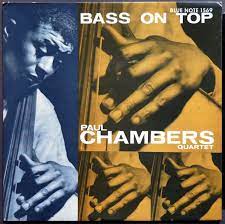
Requisites
Bass on Top ~ Paul Chambers Quartet | By Eddie Carter
I was in the mood to hear something soothing before going to bed a few nights ago. The record I chose to play inspired my first March discussion by one of the great jazz bassists, Paul Chambers. Bass on Top (Blue Note BLP 1569/BST 81569) by The Paul Chambers Quartet is a 1957 release and his second record for the label. It was one of my mom’s favorite albums to listen to when she was cooking dinner. She always loved his big and warm sound, and his playing always knocked me out whenever I heard him. He is joined on this date by a marvelous rhythm section: Kenny Burrell on guitar, Hank Jones on piano, and Art Taylor on drums. My copy is the 2021 Blue Note Tone Poet Series Stereo Audiophile reissue, sharing the original catalog number.
Side One gets underway with Paul and Kenny’s two-instrument introduction to Yesterdays by Walter Gross and Jack Lawrence. Hank and Art come in to pick up the pace to deliver the alluring melody. The standard’s only solo is a thoughtful, reflective showcase by Paul, complemented by Hank, Kenny, and Art’s delicate accompaniment leading to the gentle ending. You’d Be So Nice To Come Home To by Cole Porter brings the beat up a few notches for the bassist’s introduction, segueing into his stating the melody supported by his colleagues. Chambers starts it off with an easy swinging interpretation, then gives way to Burrell’s unhurried statement. Jones brings on the pleasant finale before the leader’s return for the reprise and conclusion.
Chasin’ The Bird by Charlie Parker affords everyone a solo opportunity and begins with Kenny’s introduction to the group’s medium melody. Paul takes the lead with a lightly swinging solo, then Hank follows with a splendid statement. Kenny comes in next for a thoroughly satisfying reading, and Art cooks comfortably in the closer, preceding the theme’s return. Dear Old Stockholm is a Swedish folk song and jazz standard that receives a medium groove by the quartet. Kenny makes the introduction, and the ensemble joins in for the opening chorus. Chambers is up first and gives a soothing interpretation. Burrell follows with a sensitive and delicate performance; then, Jones wraps up the readings with a delightfully pleasant statement until the quartet regroups for the close.
The Theme ended many of Miles Davis’ live sets. The group opens with Kenny and Paul’s introduction to their lively melody. Paul swings right out of the gate in the opening solo. Kenny follows, maintaining the infectious beat in a vibrant statement. Hank comes in and builds the next reading exquisitely; then, Art shares the finale with Paul ahead of the climax. Confessin’, aka I’m Confessin’ That I Love You by Doc Daugherty, Ellis Reynolds and Al Neiburg begins with Paul’s introduction ahead of the foursome’s lovely opening chorus. Chambers handles the first of two interpretations flawlessly with excellent taste. Jones follows with a short solo as pleasant as a Sunday evening stroll. Chambers returns to give a brief statement that brings the set to a fitting climax.
Alfred Lion produced the original session, and Rudy Van Gelder was the man behind the dials of the recording. Joe Harley supervised this reissue’s release, and Kevin Gray mastered it. The sound quality is superb, with a breathtaking soundstage. A lot of thought and care went into the remastering of this audiophile reissue. The record is pressed on 180 grams of audiophile vinyl and is incredibly quiet until the music starts. The covers could be displayed at home on any wall, and the inside gatefold photos are wonderful. Every once in a while, something magical happens in a recording session where all the musicians come together in such a way that perfection is the result. Bass on Top by Paul Chambers is one of those albums.
Paul Chambers and his bandmates compel you to listen as they’re playing and, as the album unfolds, they provide the perfect backdrop to help you unwind after a long day, night, or week. If you’re new to jazz or only know of his work as a sideman with The Miles Davis Quintet and others. In that case, I happily recommend and invite you to check out Bass on Top by The Paul Chambers Quartet the next time you’re out record shopping. It’s a stellar album of soulful, swinging jazz at its best and a title you won’t have to listen to twice to know you love it!
~ I’m Confessin’ That I Love You, Yesterdays, You’d Be So Nice To Come Home To – Source: JazzStandards.com
~ Chasin’ The Bird, Dear Old Stockholm – Source: Wikipedia.org
© 2024 by Edward Thomas Carter
More Posts: bass,choice,classic,collectible,collector,history,instrumental,jazz,music
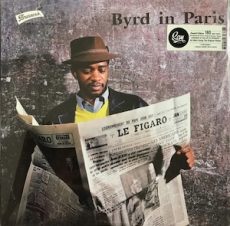
Requisites
Byrd in Paris, Volume 1 ~ The Donald Byrd Quintet Featuring Bobby Jaspar | By Eddie Carter
The Donald Byrd Quintet enters this morning’s spotlight with Byrd in Paris, Volume 1 (Brunswick 87 903), the first of two albums taken from the group’s 1958 appearance at The Olympia Theatre. Its companion release is Parisian Thoroughfare, and both were recorded at the conclusion of the quintet’s tour to Europe. Byrd in Paris was initially a French release in 1958 and would make its way to the U.S. two years later. The personnel is Donald Byrd (tracks: A1, A2, B3) on trumpet, Bobby Jaspar on flute (B1) and tenor sax (A1, A2, B3), Walter Davis Jr. on piano, Doug Watkins on double bass, and Art Taylor (A1, A2, B2, B3) on drums. My copy is the 2014 Sam Records French Mono audiophile reissue, sharing the original catalog number.
The set opens with Dear Old Stockholm, and as the song begins, Donald is off in the distance behind the quintet. He brings the horn into the forefront as he walks to the microphone, and the ensemble completes the melody. Bobby opens with a marvelous first solo. Donald is equally loose and free in the following reading. Doug offers one of the song’s best musical moments in the closing statement preceding the theme’s reprise and finale. Donald introduces Paul’s Pal by Sonny Rollins next and all the remaining tunes. The group begins with a mid-tempo melody. Bobby starts the solos with an easygoing statement. Donald follows with a neatly paced reading, and then Walter greets the finale like an old friend before the group takes it out.
Side Two gets underway with Bobby Jaspar on flute for his tune, Flute Blues. Bobby and Doug introduce the song’s first chorus with a two-instrument conversation before Walter joins them. Bobby dives into the opening statement with a consummate feeling. Doug finds a few new things to say in the second solo, and then Bobby and Doug are in complete agreement in the closing interpretation, leading back to the theme. The spotlight is on the rhythm section in Ray’s Idea by Ray Brown. Donald and Bobby sit this one out, and the trio works in perfect balance on the song’s speedy melody. Walter is the first to solo and puts the piano through a vigorous workout, then he and Art share an energetic exchange into the theme’s reprise, climax and audience’s approval.
The Blues Walk by Sonny Stitt is off and running from the ensemble’s theme. Donald opens at a blistering pace; then Bobby continues blowing up a storm. Walter communicates his ideas confidently next, and then Doug makes a few quick remarks. Art generates considerable heat in an aggressive conversation with Donald and Bobby, leading to the song’s climax and a huge ovation from the audience. Bruno Coquatrix produced the original session, and the reissue was remastered from the original tapes. This Sam Records audiophile reissue was also pressed at Pallas in Germany on 180 grams of audiophile vinyl, and the front and rear covers are sturdy. The album possesses an excellent soundstage, placing the listener in the audience. Also included is an additional insert with a photo of Donald Byrd.
I thoroughly enjoyed listening to Byrd in Paris, Volume 1. After hearing this Sam Records reissue, I’m going to revisit a few other titles I have in the library and feature them in future columns. If you’re in the mood for a live hard bop album with great tunes and tight musicianship. I invite you to consider Byrd in Paris, Volume 1 by The Donald Byrd Quintet Featuring Bobby Jaspar, on your next record treasure hunt. It’s a wonderful live album that still sounds great over six decades later and shouldn’t be missed for a spot in any jazz library!
~ Parisian Thoroughfare (Brunswick 87 904) – Source: Discogs.com ~ Dear Old Stockholm – Source: Wikipedia.org © 2024 by Edward Thomas Carter
More Posts: choice,classic,collectible,collector,history,instrumental,jazz,music,trumpet
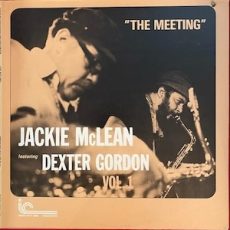
Requisites
The Meeting, Vol. 1 ~ Jackie McLean Featuring Dexter Gordon | By Eddie Carter
I was looking for something to listen to after dinner a few nights ago when I came across a title I hadn’t heard in a while by two of my favorite saxophonists, Jackie McLean and Dexter Gordon. This morning’s record from the library is The Meeting, Vol. 1 (SteepleChase SCS-1006). It hit the Danish and Japanese stores in 1974 and is the first of two live albums recorded a year earlier on July 20 and 21 at Montmartre Jazzhus in Copenhagen. The front line is Jackie McLean on the alto sax and Dexter Gordon on the tenor sax. The supporting cast for both sets is a magical rhythm section: Kenny Drew on piano, Niels-Henning Ørsted Pedersen on bass, and Alex Riel on drums. My copy is the 1976 U.S. Stereo reissue (Inner City IC 2006).
Side One opens with Jackie’s introduction of the quintet ahead of the rhythm section’s introduction to All Clean by Dexter Gordon. Both horns enter next to introduce the vibrant melody. Dexter goes to work first on a lengthy opening solo. Jackie checks in next and keeps the flame burning. Kenny makes a vigorous contribution next, and then Niels-Henning takes a brisk walk in the following reading. Dexter and Jackie return to have a spirited conversation, leading to the song’s conclusion. Rue De La Harpe by Sahib Shihab begins with the ensemble’s mid-tempo theme. Jackie has the opening chorus and takes command effectively. Dexter flies straight ahead into the following solo, and Kenny keeps things moving with considerable passion until the theme’s climax.
Side Two starts with Sunset, a hauntingly beautiful ballad by Kenny Drew that he initially recorded on Everything I Love. Both horns introduce the song, proceeding to the ensemble’s delicately tender melody. Jackie begins the opening statement gently. Dexter follows with an extremely personal interpretation, and Kenny adds a meaningful comment preceding the theme’s restatement. On The Trail by Ferdé Grofé is the third of five movements in his Grand Canyon Suite. Jackie kicks off the theme’s first chorus. Dexter takes the baton in the second chorus and then makes a distinctive impression on the first solo. Jackie speaks with captivating inspiration in the following reading. Kenny executes a rewarding performance in the closer ahead of the finale.
Nils Winther did double duty on this release. He produced and recorded The Meeting, Vol. 1. The reissue’s sound quality is excellent, with a superb soundstage that transports the listener to a front-row seat in the Montmartre audience as the musicians are performing. Since I have this album in my library, I’ll be on the lookout for its companion, The Source, Vol. 2. If you’re a fan of Jackie McLean and Dexter Gordon, I invite you to attend The Meeting, Vol. 1 on your next record shopping trip. It’s a stellar lineup with great playing from each member of the quintet and a wonderful document of a live set that anyone can revisit anytime the album is on the turntable!
~ Everything I Love (SteepleChase Records SCS-1007), The Source, Vol. 2 (SteepleChase Records SCS-1020) – Source: Discogs.com
~ On The Trail – Source: Wikipedia.org
© 2024 by Edward Thomas Carter
More Posts: choice,classic,collectible,collector,history,instrumental,jazz,music,saxophone


